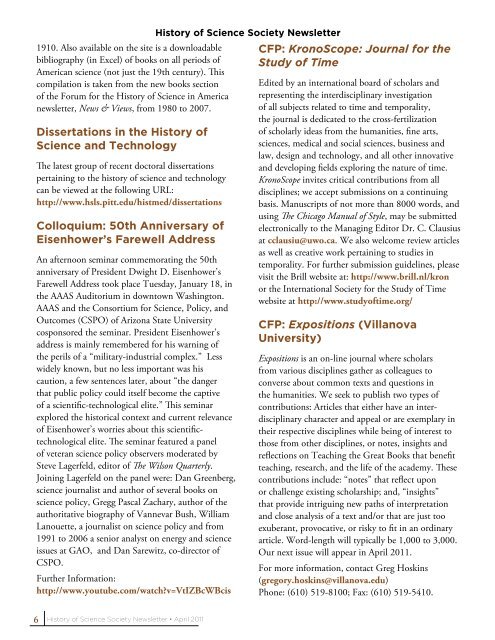Printer friendly version of Newsletter - History of Science Society
Printer friendly version of Newsletter - History of Science Society
Printer friendly version of Newsletter - History of Science Society
You also want an ePaper? Increase the reach of your titles
YUMPU automatically turns print PDFs into web optimized ePapers that Google loves.
1910. Also available on the site is a downloadable<br />
bibliography (in Excel) <strong>of</strong> books on all periods <strong>of</strong><br />
American science (not just the 19th century). This<br />
compilation is taken from the new books section<br />
<strong>of</strong> the Forum for the <strong>History</strong> <strong>of</strong> <strong>Science</strong> in America<br />
newsletter, News & Views, from 1980 to 2007.<br />
Dissertations in the <strong>History</strong> <strong>of</strong><br />
<strong>Science</strong> and Technology<br />
The latest group <strong>of</strong> recent doctoral dissertations<br />
pertaining to the history <strong>of</strong> science and technology<br />
can be viewed at the following URL:<br />
http://www.hsls.pitt.edu/histmed/dissertations<br />
Colloquium: 50th Anniversary <strong>of</strong><br />
Eisenhower’s Farewell Address<br />
An afternoon seminar commemorating the 50th<br />
anniversary <strong>of</strong> President Dwight D. Eisenhower’s<br />
Farewell Address took place Tuesday, January 18, in<br />
the AAAS Auditorium in downtown Washington.<br />
AAAS and the Consortium for <strong>Science</strong>, Policy, and<br />
Outcomes (CSPO) <strong>of</strong> Arizona State University<br />
cosponsored the seminar. President Eisenhower’s<br />
address is mainly remembered for his warning <strong>of</strong><br />
the perils <strong>of</strong> a “military-industrial complex.” Less<br />
widely known, but no less important was his<br />
caution, a few sentences later, about “the danger<br />
that public policy could itself become the captive<br />
<strong>of</strong> a scientific-technological elite.” This seminar<br />
explored the historical context and current relevance<br />
<strong>of</strong> Eisenhower’s worries about this scientifictechnological<br />
elite. The seminar featured a panel<br />
<strong>of</strong> veteran science policy observers moderated by<br />
Steve Lagerfeld, editor <strong>of</strong> The Wilson Quarterly.<br />
Joining Lagerfeld on the panel were: Dan Greenberg,<br />
science journalist and author <strong>of</strong> several books on<br />
science policy, Gregg Pascal Zachary, author <strong>of</strong> the<br />
authoritative biography <strong>of</strong> Vannevar Bush, William<br />
Lanouette, a journalist on science policy and from<br />
1991 to 2006 a senior analyst on energy and science<br />
issues at GAO, and Dan Sarewitz, co-director <strong>of</strong><br />
CSPO.<br />
Further Information:<br />
http://www.youtube.com/watch?v=VtIZBcWBcis<br />
<strong>History</strong> <strong>of</strong> <strong>Science</strong> <strong>Society</strong> <strong>Newsletter</strong><br />
CFP: KronoScope: Journal for the<br />
Study <strong>of</strong> Time<br />
Edited by an international board <strong>of</strong> scholars and<br />
representing the interdisciplinary investigation<br />
<strong>of</strong> all subjects related to time and temporality,<br />
the journal is dedicated to the cross-fertilization<br />
<strong>of</strong> scholarly ideas from the humanities, fine arts,<br />
sciences, medical and social sciences, business and<br />
law, design and technology, and all other innovative<br />
and developing fields exploring the nature <strong>of</strong> time.<br />
KronoScope invites critical contributions from all<br />
disciplines; we accept submissions on a continuing<br />
basis. Manuscripts <strong>of</strong> not more than 8000 words, and<br />
using The Chicago Manual <strong>of</strong> Style, may be submitted<br />
electronically to the Managing Editor Dr. C. Clausius<br />
at cclausiu@uwo.ca. We also welcome review articles<br />
as well as creative work pertaining to studies in<br />
temporality. For further submission guidelines, please<br />
visit the Brill website at: http://www.brill.nl/kron<br />
or the International <strong>Society</strong> for the Study <strong>of</strong> Time<br />
website at http://www.study<strong>of</strong>time.org/<br />
CFP: Expositions (Villanova<br />
University)<br />
Expositions is an on-line journal where scholars<br />
from various disciplines gather as colleagues to<br />
converse about common texts and questions in<br />
the humanities. We seek to publish two types <strong>of</strong><br />
contributions: Articles that either have an interdisciplinary<br />
character and appeal or are exemplary in<br />
their respective disciplines while being <strong>of</strong> interest to<br />
those from other disciplines, or notes, insights and<br />
reflections on Teaching the Great Books that benefit<br />
teaching, research, and the life <strong>of</strong> the academy. These<br />
contributions include: “notes” that reflect upon<br />
or challenge existing scholarship; and, “insights”<br />
that provide intriguing new paths <strong>of</strong> interpretation<br />
and close analysis <strong>of</strong> a text and/or that are just too<br />
exuberant, provocative, or risky to fit in an ordinary<br />
article. Word-length will typically be 1,000 to 3,000.<br />
Our next issue will appear in April 2011.<br />
For more information, contact Greg Hoskins<br />
(gregory.hoskins@villanova.edu)<br />
Phone: (610) 519-8100; Fax: (610) 519-5410.<br />
6 <strong>History</strong> <strong>of</strong> <strong>Science</strong> <strong>Society</strong> <strong>Newsletter</strong> • April 2011
















